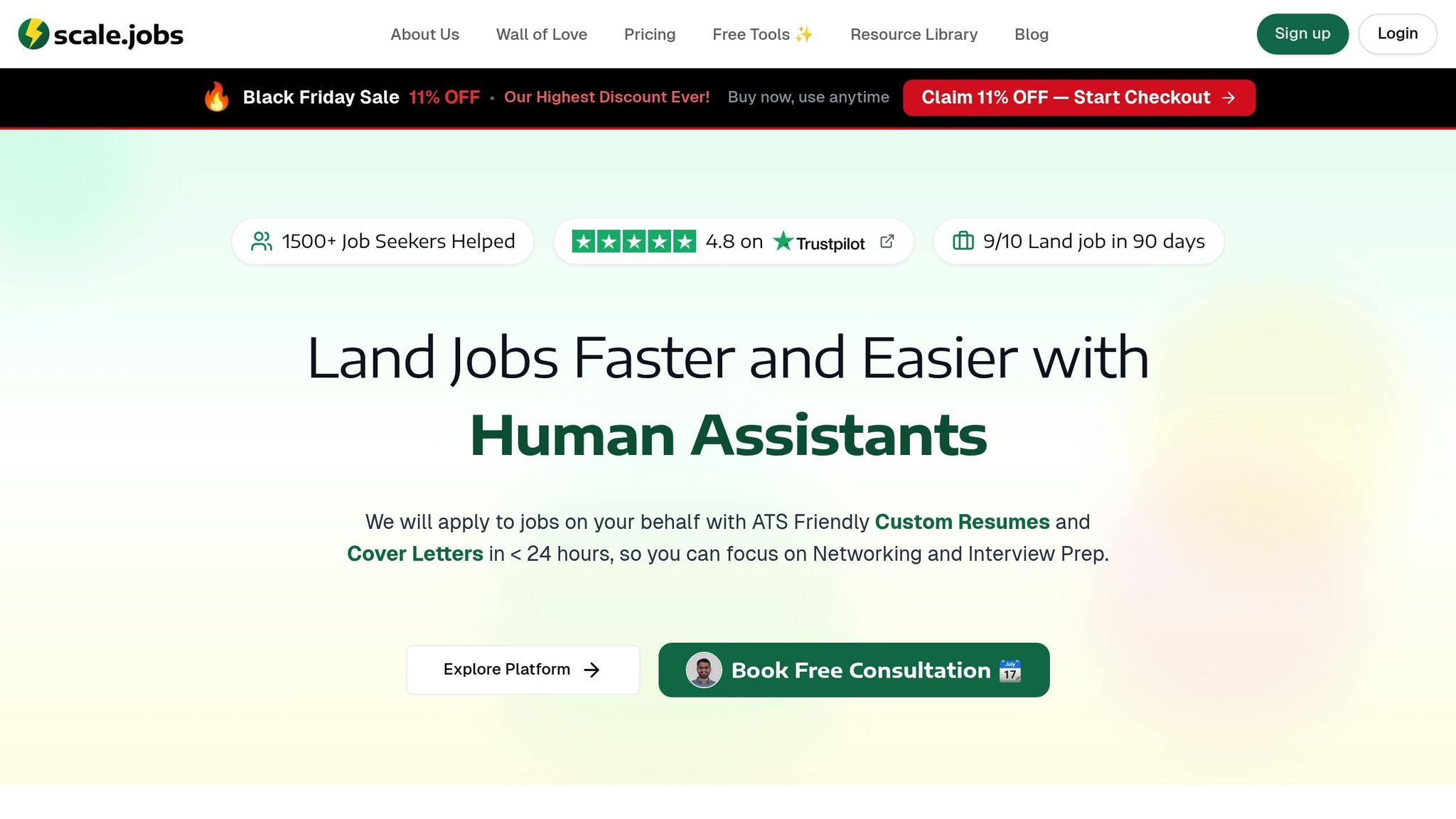Fixing Reputation Damage After a Layoff
Learn how to protect and rebuild your professional reputation after a layoff through networking, upskilling, and effective communication.

Losing your job can feel overwhelming, but it doesn’t have to define your career. Here’s how to protect and rebuild your professional reputation after a layoff:
- Stay professional: Keep your emotions in check and avoid venting publicly online. A calm, polite response leaves a lasting positive impression.
- Secure references: Request recommendations from managers or colleagues before leaving. These can support your credibility during your job search.
- Update online profiles: Refresh your LinkedIn and other platforms to reflect your current status. Use professional phrases like “Open to New Opportunities” to signal your availability.
- Upskill: Use this time to earn certifications or learn new skills relevant to your field. Platforms like Coursera and LinkedIn Learning offer flexible options.
- Network effectively: Reconnect with former colleagues and attend industry events to uncover new opportunities. Nearly half of job seekers find roles through networking.
- Craft your story: Be honest about the layoff but focus on your growth and achievements since. Practice confident, clear answers for interview questions about employment gaps.
The key is to take immediate steps to protect your reputation, focus on skill-building, and leverage personal connections. By staying proactive, you can turn a layoff into a stepping stone for future success.
Don't Let Your Layoff Define You.
Quick Actions to Protect Your Professional Reputation
The first 48 hours after a layoff are crucial - they can shape how others perceive you and influence future job opportunities.
Stay Calm and Professional
How you respond to a layoff can leave a lasting impression on former employers and colleagues. Staying calm and collected is key. Avoid the temptation to vent publicly on platforms like LinkedIn or Twitter, as emotional posts can linger online and potentially impact your professional image down the line.
When discussing your departure, keep the tone polite and focused. Thank your employer for the opportunities you had and aim for a smooth exit. Use this time to document important details about your layoff, which can help you explain the situation clearly in the future.
Seek Clarity and Secure References
Understanding the reasons behind the layoff can help you move forward with confidence. If appropriate, ask for clarification during your exit meeting. This is also a good opportunity to request written references or recommendations from managers or close colleagues while your work is still fresh in their minds. Once you’ve addressed these internal matters, shift your attention to strengthening your external professional presence.
Update Your Online Profiles
Your online presence is often the first place potential employers will look, so it’s essential to update it right away. On LinkedIn, adjust your headline and summary to reflect your current situation - phrases like "Professional in Transition" or "Experienced [Your Role] Open to New Opportunities" work well. Update employment dates and, if necessary, include a brief, neutral note about your departure.
Take time to clean up your social media profiles. Remove or hide any posts that could be seen in a negative light by future employers. Ensure your contact information is up to date and consider using LinkedIn’s “Open to Work” feature to let recruiters know you’re actively seeking new opportunities.
How to Rebuild and Improve Your Professional Reputation
Once you’ve tackled any immediate challenges, it’s time to focus on rebuilding your professional reputation. This isn’t a quick fix - it’s a process that requires patience and consistent effort. But with the right strategies, you can come out stronger and more prepared for future opportunities.
Collect References and Testimonials
References and testimonials are powerful tools for demonstrating your skills and character, especially when potential employers may have concerns about your layoff. While initial references can address short-term doubts, thoughtful and detailed testimonials help solidify your long-term credibility.
Ask peers for specific LinkedIn recommendations that highlight your key projects and strengths. These endorsements can emphasize your teamwork, problem-solving abilities, and daily work ethic - qualities that hiring managers value. Be sure to guide your colleagues by providing examples of your achievements to help them craft meaningful recommendations.
If you’ve worked with clients or external partners, their testimonials can also be incredibly impactful. This is particularly true for roles that focus on client relationships or business development, as such testimonials showcase your ability to deliver results and maintain strong professional connections.
Learn New Skills and Get Certifications
An employment gap can be reframed as an opportunity for growth by focusing on skill development. Earning industry-specific certifications shows that you’re staying current and committed to your field. For instance, tech professionals might explore certifications from Amazon Web Services, Microsoft, or Google, while marketing professionals could pursue credentials like Google Analytics or HubSpot certifications.
Online platforms like Coursera, LinkedIn Learning, and Udemy offer flexible courses that you can complete at your own pace. Many of these programs provide certificates upon completion, which you can then add to your resume and LinkedIn profile. To make the most impact, focus on skills that align with the roles you’re targeting. Reviewing job postings can help you identify the most sought-after qualifications, turning these new skills into valuable talking points during interviews or networking conversations.
Network with Industry Professionals
Once your credentials are refreshed, it’s time to expand your professional network. Networking is especially crucial after a layoff, as personal connections can help counter any lingering doubts about your employment status. Start by reconnecting with former colleagues - not necessarily to ask for job leads, but to nurture relationships and share your current situation. Often, these existing connections can lead to unexpected opportunities.
Broaden your reach by attending industry events, conferences, local meetups, or even virtual gatherings. These spaces not only help you stay informed about industry trends but also allow you to meet new professionals. LinkedIn is another invaluable tool for networking. Use its search features to connect with individuals at companies you’re interested in, and take the time to craft personalized connection requests. A tailored message gives you the chance to share your story and make a stronger impression.
Networking can be a game-changer. In fact, 46% of Scale.jobs users reported landing jobs through personal connections and effective networking efforts. For example, Emerson Quinn, a Director of Customer Success, shared how working with Find My Profession’s Reverse Recruiting service helped her not only secure a new role but also build lasting industry relationships:
"She also expanded my network, so now tons of professionals in my industry can find me in the future."
Job Search Platforms That Help Repair Your Reputation
Recovering your professional reputation after a layoff requires more than just determination - it demands the right tools. The platforms you choose should not only connect you with opportunities but also help you craft a compelling narrative to address employment gaps.
Top Platform Comparison
There are several platforms out there designed to assist job seekers, but they vary widely in their approach and effectiveness:
- Find My Profession: Specializes in resume writing and LinkedIn optimization. While their human expertise produces polished documents, their focus is primarily on one-time services rather than ongoing job application support.
- LazyApply: Automates the application process by submitting resumes en masse. While convenient, this approach often leads to generic applications that may fail to address the specific storytelling needed to explain layoffs.
- Jobscan: Offers tools for ATS (Applicant Tracking System) optimization, helping to refine resumes for better compatibility with hiring software. However, it lacks the personal touch required to craft a convincing narrative around employment gaps.
- Teal HQ: Provides application tracking and career coaching in a self-guided format. While useful for some, this DIY approach may not offer the strategic guidance necessary to effectively reframe a layoff.
While these platforms offer useful features, their limitations reveal a gap for those who need a more holistic and tailored approach to job searching.
Why scale.jobs Works Better

Scale.jobs sets itself apart by offering a comprehensive, human-centered solution tailored to the unique challenges faced by professionals after a layoff. Instead of focusing on isolated aspects of the job search, scale.jobs delivers an all-in-one approach that combines advanced technology with personalized support. Here's what makes it stand out:
- Human Assistant Model: Dedicated assistants and reverse recruiters ensure every application is customized to address employment gaps and highlight your strengths.
- ATS-Optimized Documents: Resumes and cover letters are not only tailored to specific job postings but also designed to meet ATS requirements, increasing your chances of getting noticed.
- Transparent Workflow: With real-time updates via WhatsApp and time-stamped proof-of-work screenshots, you have full insight into the progress of your applications.
- Flat-Fee Pricing: Instead of recurring subscriptions, scale.jobs offers flat-fee campaign bundles, making it easier to manage costs during your job search.
- Comprehensive Free Tools: Beyond its human-powered services, scale.jobs includes an ATS checker, cover letter generator, and job application tracker to give you more control over your job search process.
How to Discuss Layoffs in Job Applications and Interviews
How you present your layoff experience can significantly influence your chances with potential employers. Hiring managers generally understand that layoffs happen, but they’re more interested in seeing how you dealt with it and what you learned. The key is to shift the focus from the layoff itself to the strengths and skills you bring to the table.
Create a Positive Layoff Story
Stick to the facts, then highlight your growth. When explaining your layoff, be honest but keep it short. If your company downsized, restructured, or faced budget challenges, briefly mention it and move on to your accomplishments and growth.
Here’s a simple framework: situation, action, result. For instance, instead of saying, “I was part of a 30% reduction in the marketing team due to budget cuts,” you could say, “My previous company restructured its marketing department, which allowed me to focus on advancing my digital marketing skills and earning certifications in Google Analytics and HubSpot.”
Emphasize what you gained, not what you lost. Use your layoff as an opportunity to showcase new skills, professional development, or a strategic career shift. Highlight achievements like completing courses, earning certifications, or taking on freelance projects that demonstrate your dedication to growth.
Stay professional and avoid negativity about your former employer. A neutral and professional tone shows hiring managers that you’ll bring a positive attitude to their organization.
Once you’ve crafted your positive narrative, ensure it translates smoothly into confident and consistent responses during interviews.
Practice Answers for Layoff Questions
Prepare for common questions like "Why did you leave your last position?" or "Can you explain the gap in your employment?" Rehearse your answers until they feel natural and confident.
Use the STAR method to structure your responses. The STAR method - Situation, Task, Action, and Result - keeps your answers clear and focused. For example, explain the situation (the layoff), the task (finding new opportunities), your actions (upskilling, networking, or job searching), and the results (improved qualifications, a stronger network, or a clearer career path).
Leverage AI-powered interview tools to refine your responses. These platforms simulate real interview scenarios and provide feedback to help you improve your delivery and boost your confidence.
"You should focus on what matters the most - Interview Prep - and let us handle the rest." – Shubham Dhakle, Outcome Manager, Scale.jobs
Be ready to discuss your job search strategy, targeted roles, and genuine interest in the company. This reinforces that the layoff was simply a stepping stone in your career journey.
Seek feedback from career coaches, trusted colleagues, or professional services that offer interview preparation as part of their job search support. Their insights can help you polish your responses and stand out in interviews.
Building Long-Term Career Strength
Recovering from a layoff isn’t just about finding your next job - it’s about creating a career that can withstand future challenges. The professionals who thrive over time are the ones who treat setbacks as opportunities to strengthen their foundation and expand their skills.
Keep a growth mindset as you move forward. The tools you’ve sharpened during your layoff - like networking, personal branding, and ongoing learning - shouldn’t be set aside once you’re back in the workforce. Instead, make them part of your routine to stay ready for whatever the future holds.
Expand your professional network beyond your current role or industry. The relationships you nurture today could become your safety net tomorrow. Attend industry events, join professional groups, and stay in touch with former colleagues. A diverse network not only offers support but can also alert you to upcoming changes in your field.
Commit to continuous skill development, even when you’re employed. The job market changes fast, and the skills that landed you your current role might not be enough to keep you competitive in the future. Dedicate time each month to learning new tools, earning certifications, or building leadership skills. At the same time, consider diversifying your income streams to strengthen your financial and professional resilience.
Develop multiple income streams. Whether it’s freelancing, consulting, or building expertise others will pay for, side projects can provide financial security and enhance your professional reputation. Plus, these endeavors often become great talking points in interviews and may even open doors to full-time opportunities.
Take advantage of job search platforms that grow with your career. Platforms like scale.jobs go beyond helping you land your next job. They offer tools for networking, skill assessments, and professional development, helping you build a career that lasts. Their human-focused approach ensures that you’re not just filling a role but growing meaningful professional relationships.
Strong careers are built on preparation and adaptability. By staying connected to your network, continually upgrading your skills, and keeping an eye on the broader job market, you can transform a layoff from a setback into a stepping stone for long-term success.
FAQs
How should I explain being laid off during a job interview without hurting my chances?
When discussing a layoff during an interview, it's important to be honest while keeping your explanation short and to the point. Share the facts about the situation - whether it was due to company restructuring or external challenges - without assigning blame or dwelling on the negatives.
Use the opportunity to highlight the skills you gained or achievements you accomplished in your previous role. Show how those experiences have equipped you to make meaningful contributions to the prospective employer.
Wrap up on a positive note by expressing your excitement for the position and your eagerness to add value to their team. This keeps the focus on the future and leaves a professional, confident impression.
What skills or certifications can help me rebuild my professional reputation after being laid off?
Rebuilding your professional reputation means zeroing in on the skills and certifications that matter most in your industry. Start by mastering technical tools that are widely used in your field - think project management software, coding languages, or data analysis platforms. Earning certifications such as PMP (Project Management Professional), AWS Certified Solutions Architect, or Google Analytics Certification can also add weight to your resume and signal expertise to potential employers.
Don’t overlook the importance of soft skills like communication, adaptability, and problem-solving - they're qualities that employers consistently value. To make your job search smoother, consider using platforms like scale.jobs, which offer helpful tools such as an ATS-friendly resume builder and AI-driven application support. These resources can help ensure your skills and certifications catch the attention of recruiters.
How can I effectively use my professional network to find a job after being laid off?
After experiencing a layoff, leaning on your professional network can be one of the most effective ways to uncover new opportunities. Start by reaching out to trusted colleagues, former supervisors, and industry connections. Share a brief message about your current situation and the kind of role you're looking for - it doesn’t need to be overly detailed, just clear and direct.
You can also ask for referrals or introductions to others in their network who might be hiring. At the same time, make sure your LinkedIn profile is up-to-date, signaling your availability to potential employers. Actively participating in LinkedIn posts, comments, and groups tied to your industry can also help you stay visible and connect with others. Remember, networking isn’t just about asking for favors - it’s about maintaining relationships and being part of the conversation.
If you’re looking for extra help, platforms like scale.jobs provide tools to simplify your job search. They offer features like AI-driven resume customization and human assistants who can help you stay on top of your applications.




